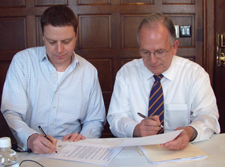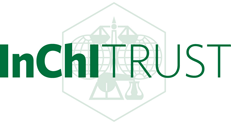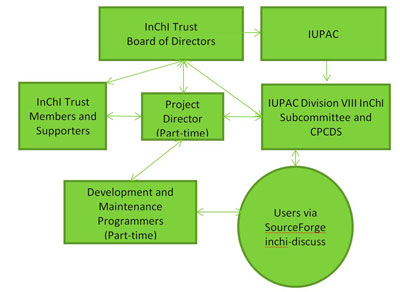
IUPAC and InChI
The IUPAC International Chemical Identifier (InChITM) is a non-proprietary identifier for chemical substances that enables easier linking of diverse data compilations. It was initially developed under IUPAC Project 2000-025-1-800 during the period 2000-2004 and continues to be extended to new areas of chemistry and further developed. See more information on the IUPAC InChI Project webpage and further details on InChI Working Groups.
IUPAC and the InChI Trust Agree Upon Conditions for Collaboration
At the third meeting of the InChI Trust Board of Directors, in San Francisco, USA, on 21 March 2010, an agreement (see text below) between IUPAC and the InChI Trust was signed by Jason Wilde (publishing director, Nature Publishing Group, and chairman of the InChI Trust Board) and Terry Renner (IUPAC executive director). This sets out the conditions under which the two organizations intend to further develop and maintain the International Chemical Identifier (InChI). The schematics below attempts to explains how the different bodies and interested parties will work together, and how input from the community is fed into the project for future consideration and development. The agreement was updated in 2016.
The InChI Trust and IUPAC: Heads of Agreement
1.The InChI Trust, established in May 2009, provides a means of continuing the development and maintenance of the InChI standard with funds from annual membership dues.
2.The IUPAC Division VIII InChI Subcommittee (hereinafter called the “IUPAC InChI Subcommittee”) represents IUPAC’s authority for recognition of the InChI standard.
3.The InChI Trust Board of Directors includes a IUPAC representative with full voting rights.
4.Requests for changes, whether corrections or extensions, to the InChI algorithm and/or the related InChIKey hash algorithm can arise from InChI Trust members or other InChI users, or from within IUPAC.
5.The IUPAC InChI Subcommittee and the InChI Trust Project Director will consider any requests for change, define corresponding requirements and communicate these requirements to the InChI Trust with suggestions for prioritisation if necessary.
6.The InChI Trust will make arrangements for work needed to implement accepted changes, discussing any prioritisation issues with the IUPAC InChI Subcommittee. In case of disagreement over priorities, the Trust, as provider of funds for the work, will have the final say. However, it is open to IUPAC to provide alternative sources of funding for any work connected with InChI development. Conversely, the Trust may contribute funding towards projects of the IUPAC InChI Subcommittee.
7.Any new (corrected/extended) version of InChI/InChIKey or related standard software will require IUPAC approval [i.e. endorsement by IUPAC Division VIII and IUPAC’s Committee on Publications and Cheminformatics Data Standards (CPCDS)] before release. This will normally involve consultation of the 100+ members of the SourceForge inchi-discuss list; this is the equivalent of IUPAC’s ‘public review’. Review by IUPACs Interdivisional Committee on Terminology, Nomenclature and Symbols is not regarded as appropriate for software products of this type. New versions of InChI/InChIKey and related standard software will be released on the IUPAC and InChI Trust websites
8.All releases of InChI algorithm will be on behalf of IUPAC and the InChI Trust (as joint licenser) and will continue to be made available under an open-source license as mutually agreed between IUPAC and the InChI Trust.

